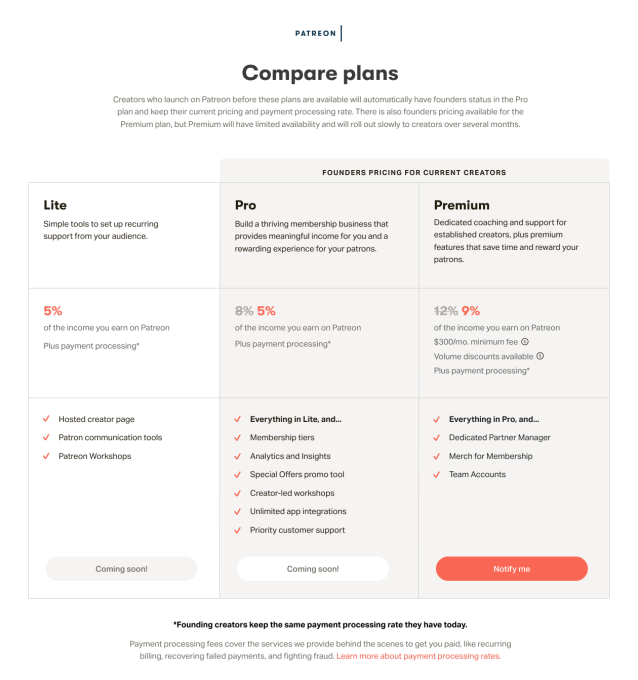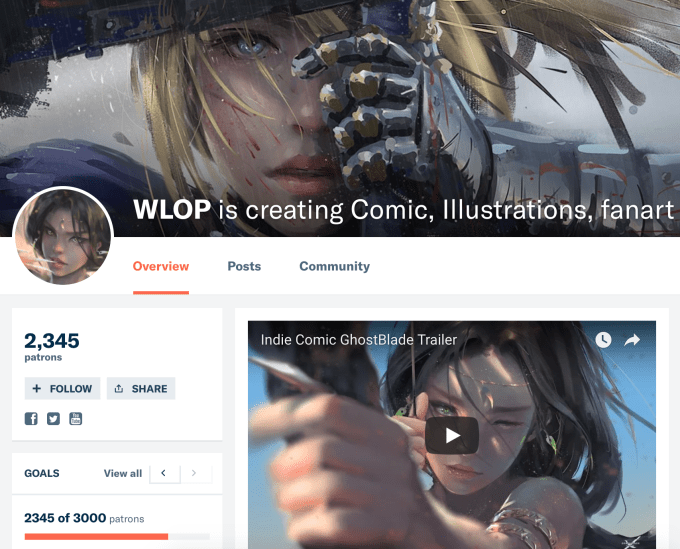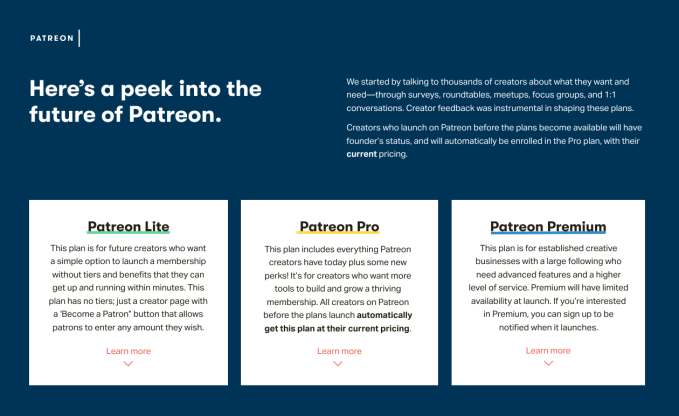Patreon couldn’t survive charging all creators just a 5 percent rake on the monthly subscriptions they earn from fans while building commerce tools like CRMs and merchandise to try to stay ahead of Twitch, YouTube and Google. But it also didn’t want to screw all its loyal early creators.
So today, Patreon is overhauling its pricing. Any creator can still get a 5 percent rate, but just for a Lite version without bonus tools or different fan tiers. All of Patreon’s extra features will now be in the Pro plan, with an 8 percent rate, but with existing creators grandfathered in at 5 percent. And the new Premium enterprise plan for 12 percent (9 percent for existing creators) will offer full-service merchandise sales, multi-user team accounts and dedicated customer support.
If you want the lower grandfathered rates, you’ll need to join Patreon in the next few weeks before the new rates go into effect in early May.

“With this change, Patreon is a long-term independent company that doesn’t need anyone else. That’s the move we’re making here,” says Patreon’s SVP of Product, Wyatt Jenkins. More sustainable pricing means creators won’t have to fear Patreon selling out in desperation to someone like Facebook that might neglect or exploit them.
Instead, Patreon CEO Jack Conte tells me he wants to balance powerful features with right-sized pricing for different creator types to become the platform-agnostic home for subscription patronage when tech giants are each trying to build their own. “To have a different membership for each distribution platform, that’s not going to work. You need a single place for the bottom of your distribution funnel,” Conte explains.
Balancing rates and resources
Patreon now has 3 million fans paying 100,000 creators more than half a billion dollars per year, and it will cross $1 billion in payouts in 2019 after six years in business. But Patreon was starving on its 5 percent rate, which some venture capitalists tell me is why they passed on its funding rounds totaling $105 million led by Thrive Capital and Index. Now it might make enough to keep the lights on, retain ownership and maybe even earn a profit one day.

Jenkins tells me Patreon spent a year talking to more than 1,000 creators to figure out how to re-price its offering. “People don’t like change. But I think in terms of change, we’re going to be able to invest in the different products in different ways. We can put a lot of horsepower into membership,” he explains. The company didn’t want to screw up like when it changed its payment processing rates a year ago, leading to creator backlash and some exodus. “We unilaterally did something that impacted creators’ patrons. That was the real landmine we stepped on.”
Patreon’s new rates
What Patreon discovered was some creators, especially individuals and hobbyists, didn’t care for bells and whistles. They wanted cheap and easy recurring payments so they can focus on their art, so Patreon made the 5 percent Lite plan that strips out the extra features but keeps the old rate.
More serious videographers, illustrators, comedians and pundits wanted to offer different price tiers for different levels of exclusive content. They need analytics, special offers, integrations with other productivity and commerce apps and priority customer support when things break. That’s what creators will get for 8 percent, unless they’re grandfathered in at 5 percent.

But Patreon also found there were whole media organizations with 50 employees built atop its patronage platform. They needed to be able to share accounts and get immediate support when necessary. Meanwhile, tons of creators see merchandise as a powerful way to lure in fans who want signed photos, stickers and other swag each month. “Eighty-five percent of our creators tell us we need merchandise. ‘We spend our days in the post office licking stamps. You can get great negotiation leverage since you have scale, so why aren’t you helping us with this?’ We can’t build that on 5 percent,” Jenkins tells me. They’ll all pay the 12 percent Premium plan price unless grandfathered in at 9 percent. Patreon will, in return, process, pack and ship all their merchandise.
Patreon is also changing its payment processing fees to make sure it doesn’t overpenalize smaller contributions, like creators’ popular $1 per month tiers. Now all transactions over $3 incur a 2.9 percent plus $0.30 fee similar to Stripe’s industry standard, while microtransactions under $3 cost 5 percent plus $0.10. Existing creators get the old rates, and people paying via PayPal from outside the U.S. get hit with an extra 1 percent fee.
The battle for fan subscriptions
Surprisingly, one of Patreon’s most popular creators told me they actually felt bad about being grandfathered in at a lower price, because why should they get special treatment compared to other artists who just might not be as tech savvy. That said, they weren’t going to voluntarily pay a higher rate. “I guess I’m not surprised,” Conte responds. “I’ve found that creators are really humble and selfless, always thinking about other people. I can imagine them saying ‘What about these people? Why am I paying less than them?”
If Patreon can power through the rate change without breaking momentum, it could have a bright future. It’s started a patronage trend, but leaked documents show Facebook plans to charge creators up to 30 percent like YouTube already does, and Twitch charges an astronomical 50 percent. But with far more restrictions on content and far more distrust accrued after years of forsaking creators and tense negotiations, Patreon’s neutral platform with the cheapest rate could remain the fan subscription leader at a time when ad revenue shares are proving inadequate to support turning one’s passion into their profession.

When TechCrunch broke the news that Facebook planned to charge up to 30 percent, Conte said, “Honestly, it was relieving but really disappointing in some way. I think competition is good. I hope there are many membership products. I hope they’re successful and [give creators a choice]. Right now, it’s not a choice. Facebook’s product is not usable. The folks that have used Facebook’s product have turned it off. From a competitor standpoint, it confirmed my thought that Facebook doesn’t understand creators.”
That’s also why he hopes that one day the tech giants might just integrate Patreon rather than compete, and they could each get a cut of subscription revenue.
Looking forward, he says the toughest challenge for Patreon will be building three different products for three distinct types of creators without the infinite wallets of its rivals. “I think Patreon will be raising for a long time,” Conte says. That will fund Patreon’s plans for eventual international operations, where 40 percent of patrons and 75 percent of creators live. Right now Patreon is offered only in English and supports U.S. dollars. But if it can spin up local languages, currencies and payment processors, Patreon could be where creators around the world go to share with their biggest fans.































Comment